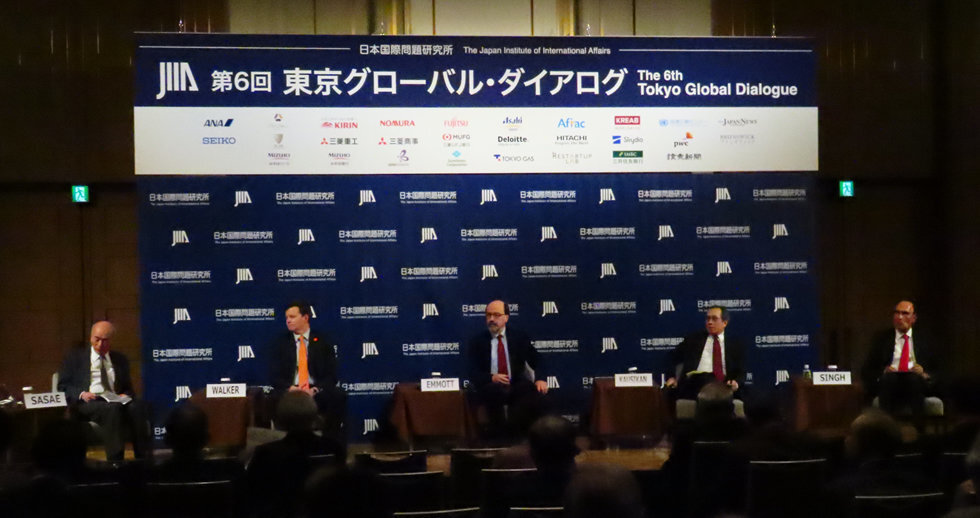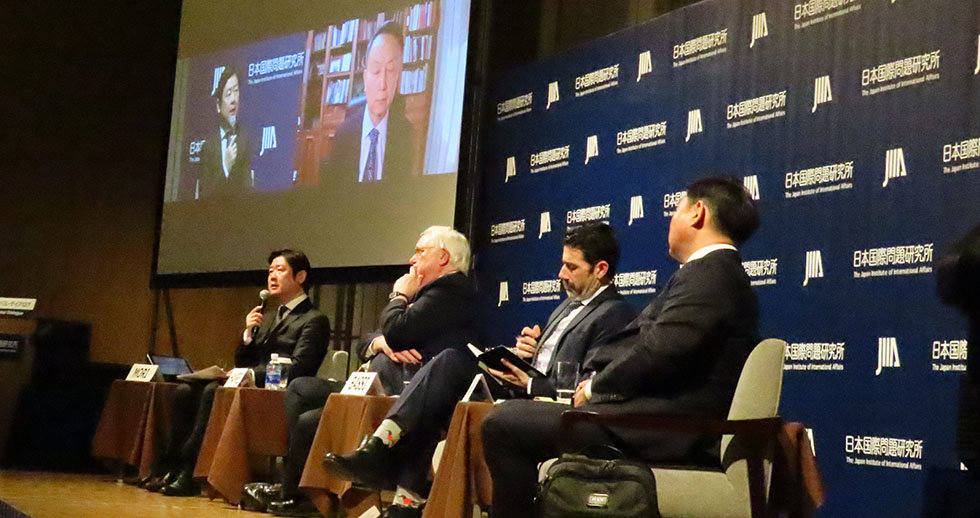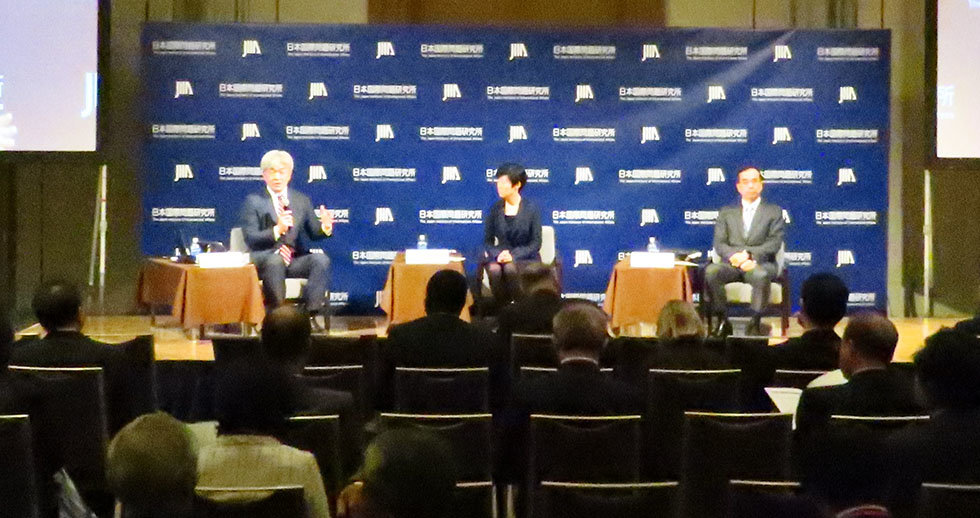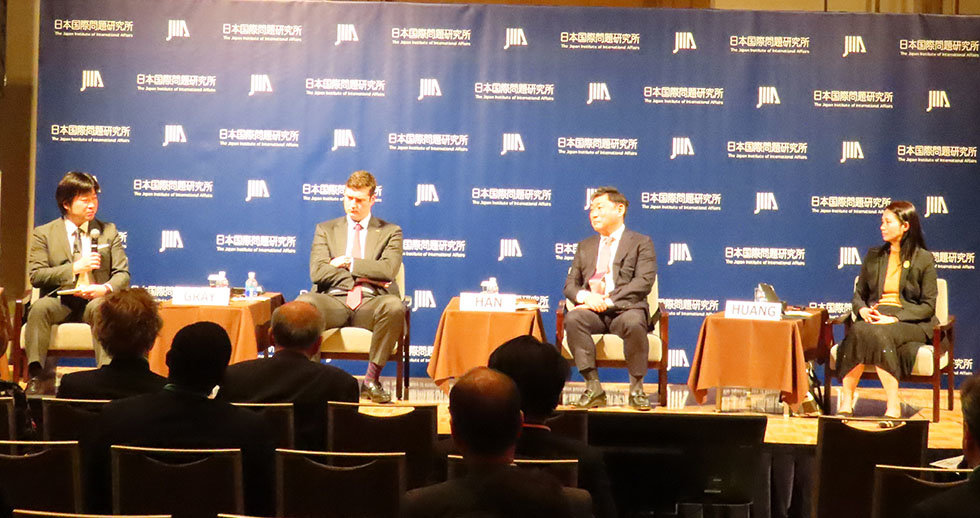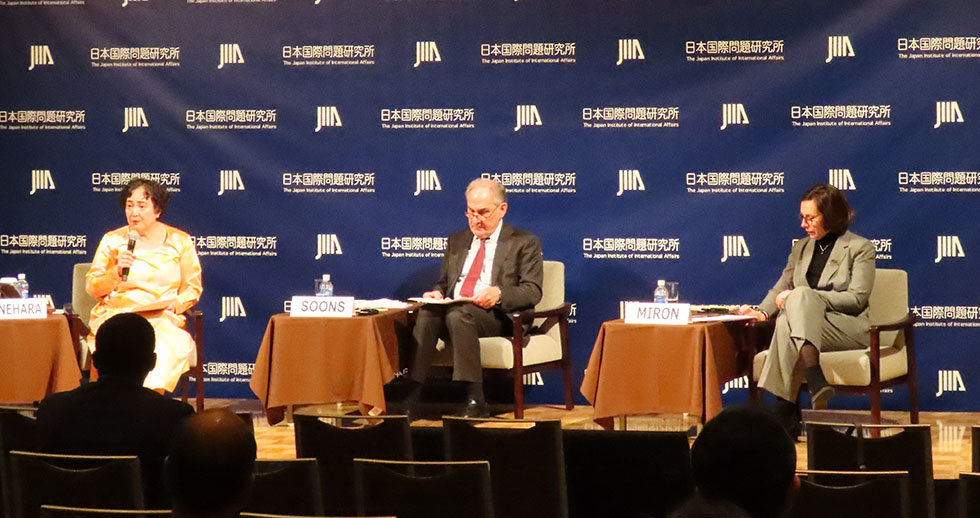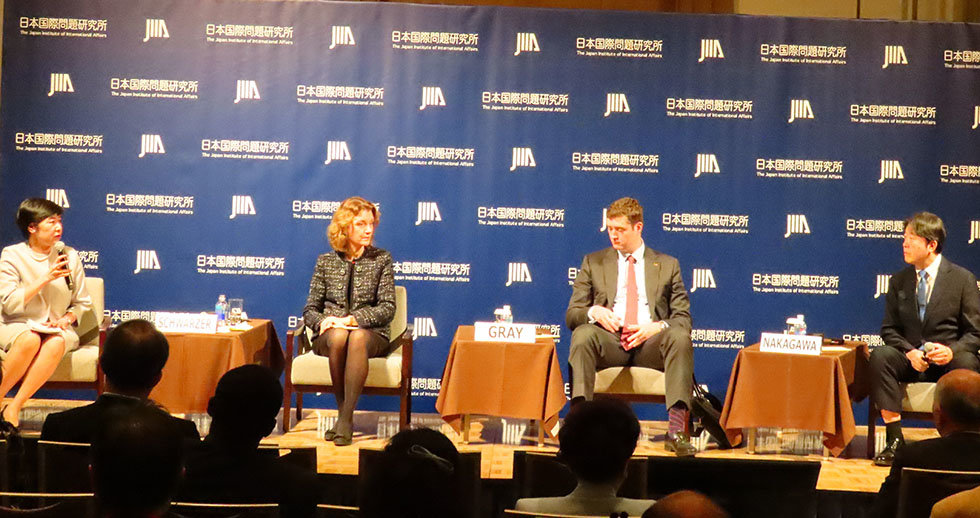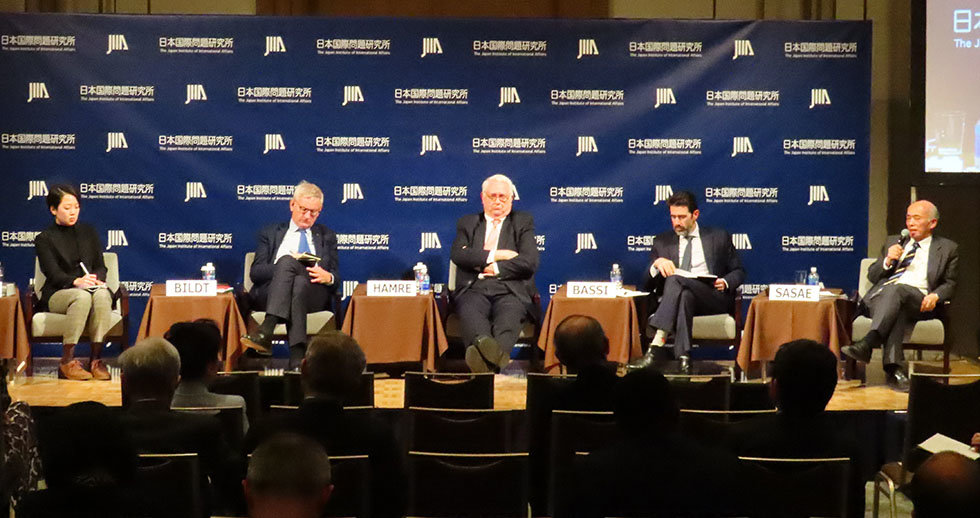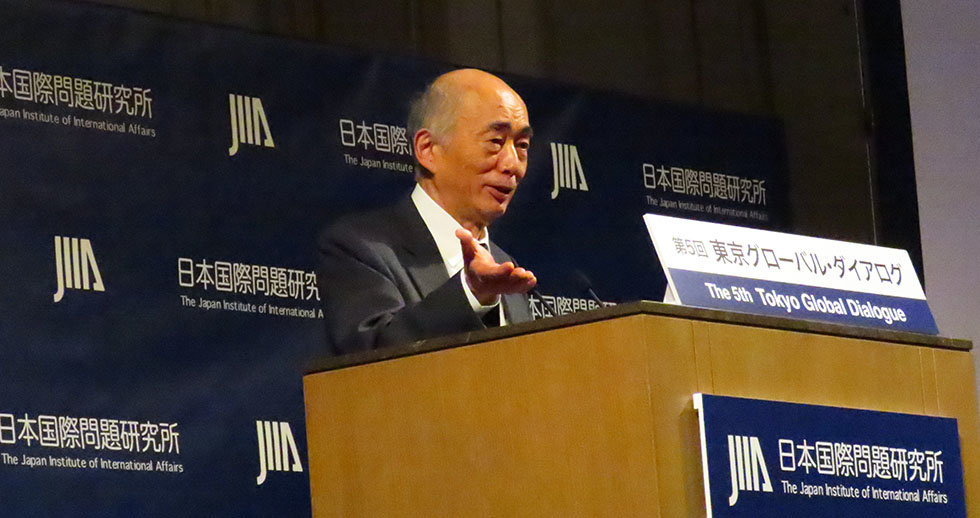The Japan Institute of International Affairs (JIIA) held the 6th Tokyo Global Dialogue (TGD6) at The Okura Tokyo on Wednesday, January 29 and Thursday, January 30. This year's theme was "A Quest for Global Resilience" and, as noted by JIIA President Kenichiro Sasae in his opening remarks at the beginning of the conference, "This theme conveys a sense of crisis about the diminishing governance fostered within the international community during the post-Cold War era, as well as a strong message that Japan must strive to revive and regenerate this power as a member of the liberal camp".
On January 29, the first day of the conference, discussions were held in sessions on "The New US Administration and International Order", "Lessons from the History of the Twentieth Century" and "Europeʼs Security". This day was wrapped up by remarks from Prime Minister Shigeru Ishiba. On the following day (January 30), discussions were held in sessions on "Artificial Intelligence and International Peace and Security", "Chokepoints in the Indo-Pacific" and "Re-constructing Global Architecture" before President Sasae concluded the two-day event with closing remarks.
1. Outline
(1) Dates
January 29, 2025 (Wednesday)
January 30, 2025 (Thursday)
[Program] https://www.jiia.or.jp/TGD/tgd6/en/
(2) Venue
The Okura Tokyo (Minato-ku, Tokyo) and online
(3) Number of participants (number of invitees for on-site participation, number of pre-registered participants for both on-site and online participation)
On-site participants: approx. 400 people in total
Registrants for online participation: approx. 800 people
2. Speakers: Approximately 40 speakers from 10 countries/regions
Nobumasa Akiyama Director, Center for Disarmament, Science and Technology, JIIA
Marie-Doha Besancenot Assistant Secretary General for Public Diplomacy Division, NATO
Jean-Christophe Boucher Associate Professor, University of Calgary
Victor Cha President of the Geopolitics and Foreign Policy Department and Korea Chair, CSIS / Distinguished University Professor, Georgetown University
Patrick M. Cronin Asia-Pacific Security Chair, The Hudson Institute / Scholar in Residence, Carnegie Mellon University
Bill Emmott Chairman, The Institute for International Strategic Studies (IISS)
Ofer Fridman Senior Lecturer in War Studies, King's College London
Navin Girishankar President, Economic Security and Technology Department, CSIS
Brendan Groves Chief Legal Officer at Skydio / Former Associate Deputy Attorney General, US DOJ
H.E. Mr. Justin Hayhurst Australia's Ambassador to Japan
Takako Hikotani Professor, Gakushuin University International Centre
Kazuhiro Horie Vice-Commissioner & Chief Technology Officer, Acquisition, Technology & Logistics Agency (ATLA)
Yuichi Hosoya Professor, Keio University
Keiichi Ichikawa Assistant Chief Cabinet Secretary / Deputy National Security Adviser, Cabinet Secretariat
Ren Ito Co-Founder and COO, Sakana AI
Jakub Jakóbowski Deputy Director, Centre for Eastern Studies (OSW)
Ken Jimbo Professor, Keio University
Bilahari Kausikan Honorary Fellow, The Middle East Institute, National University of Singapore
Shingo Kayama Strategy, Risk & Transactions Leader, Deloitte Tohmatsu LLC / Technology Sector Leader, Deloitte Asia Pacific
Long Ke Senior Fellow, The Tokyo Foundation for Policy Research
Shigeru Kitamura Former Secretary-General, National Security Secretariat
H.E. Mr. KIUCHI Minoru Minister in Charge of Economic Security
Hideya Kurata Professor, National Defense Academy of Japan / Adjunct Fellow, JIIA
Barak Kushner Professor of East Asian History, University of Cambridge
Kyoko Kuwahara Research Fellow, JIIA
Tomasz Lukaszuk Former Ambassador and lecturer/PhD at the Warsaw University
Federica Mogherini Rector, The College of Europe / Former High Representative of the European Union for Foreign Affairs and Security Policy
Hiroshi Nakanishi Professor, Kyoto University
Izumi Nakamitsu Under-Secretary-General and High Representative for Disarmament Affairs, United Nations Office for Disarmament Affairs
Vipin Narang Frank Stanton Professor of Nuclear Security, Massachusetts Institute of Technology
Shin Oya Chief Analyst, Sojitz Research Institute
H.E. Dr. Cheol-hee Park South Korea's Ambassador to Japan
H.E. Mr. Hanno Pevkur Minister of Defence of the Republic of Estonia
Hemant Krishan Singh Director General, The Delhi Policy Group (DPG) / Former Ambassador of India to Japan
Randall Schriver Chairman of the Board, The Project 2049 Institute / Partner, Pacific Solution
Noah Sneider East Asia Bureau Chief, The Economist
Joshua W. Walker President & CEO, Japan Society
Junhua Wu Senior Research Counselor, The Japan Research Institute Ltd.
3. Outline of discussions
(1) Wednesday, January 29
① The New US Administration and International Order
- It was pointed out that the policy community in Washington does not fully grasp the direction of the newly-inaugurated second Trump administration, that President Trump does not pay attention to the interconnectedness of various initiatives, and that various policy groups will thus likely end up unified under President Trump.
- However, a certain degree of continuity was identified in the US's Indo-Pacific policy through the Obama, Biden and Trump administrations resulting from the strategic competition between the US and China. Ensuring channels for dialogue and enhancing trust between Japan and the US were then emphasized as recommended first moves following Trump's inauguration. It was also suggested that relations could be notably strengthened by frankly explaining to President Trump at summit meetings what Japan and other countries are trying to do for themselves and what they can do for the US.
- Attention was called to the increasing severe security environment in the Indo-Pacific region and a recommendation made that Japan voluntarily boost its defense capabilities commensurate with the actual dangers it faces, regardless of the returning President Trump's advocacy of "peace through strength" and calls for increased defense spending by US allies.
- The importance of emerging technologies such as cyber technologies, artificial intelligence (AI) and drones was also emphasized, as was the significance of Japan-US industrial cooperation in these areas. On Nippon Steel's attempt to acquire US Steel, there was a consensus that building industrial trust between the two countries will become even more essential in the future.
- The necessity of understanding that tariffs are only a bargaining chip for the self-styled "Tariff Man" President Trump, of negotiating with an open mind, and of not harboring unreasonable fears of tariffs was stressed. It was also discussed that the impacts of excessively high tariffs on the US economy, including inflation, should be closely monitored in the course of negotiations.
- Some participants voiced concerns about President Trump's lack of interest in the international order, the risk that he would make deals leaving allies out of the loop, and his readiness to impose punitive tariffs on countries that do not agree with his wishes. They also deemed it likely that President Trump would play "bad cop" with Western leaders but "good cop" vis-à-vis President Putin and President Kim Jong-un in negotiations.
② Lessons from the History of the Twentieth Century: The Era of the Two World Wars and the Cold War
- This session traced the history of the 20th century, which experienced two world wars and the Cold War, and examined the challenges facing Japan and the international community today.
- History is sometimes used politically in East Asia and, although it is difficult to settle issues surrounding history, the session presented the possibility of reconciliation through a combination of ongoing and future efforts. It was also pointed out that we are currently witnessing "the end of the 20th century" and that Japan needs to rethink its national strategy.
- Session participants looked at how the challenges facing Japan today can be understood from the perspective of global history. Citing the case of the Racial Equality Proposal presented by Japan at the 1919 Paris Peace Conference, discussants pointed out the potential global impact of Japan's actions and the need for self-awareness in that regard.
- The floor suggested that the reconstruction of a stable international order requires the inclusion of developing countries, and that Japan could play a role in this respect. Issues were also raised regarding historical analogies, e.g., whether a long-term historical perspective of modern times reveals any signs that conflicts comparable to past wars will occur in the near future.
③ Europe's Security and Its Implications to the Indo-Pacific
- The session "Europe's Security and Its Implications to the Indo-Pacific" focused on the geopolitical implications of the Ukrainian conflict.
- In his keynote speech, Estonian Defense Minister Hanno Pevkur stressed that Russia, supported by a new axis comprising North Korea, China and Iran, must not be allowed to win the war in Ukraine, that the burden of the war must not be placed solely on Ukraine, and that democratic countries must support Ukraine and thereby raise the cost of the war for Russia. He made clear that the Baltic states' defense spending already amounted to more than 5% of their GDP, with Estonia's being the highest among them, and called on all other NATO states to do more. He then argued that ending the war would require guarantees of a just and lasting peace, including compensation for the damage caused by Russia to Ukraine, as well as sufficient coercive force, i.e., military strength, to achieve these.
- The panelists discussed the impact of the war in Ukraine on global deterrence, particularly in the Indo-Pacific region, and the realities of Russian influence operations in Ukraine. There was consensus that the manner in which the war in Ukraine is ended will be of critical importance for deterring attempts to change the status quo in Asia.
- There was also discussion on the rise of far-right parties and other manifestations of domestic political turmoil in Europe and the US that are shaking up foreign policy and undermining democratic order. The importance of strategic communication, education and international cooperation to counter disinformation and ensure democratic resilience was stressed.
④ 【Remarks】H.E. Mr. ISHIBA Shigeru, Prime Minister of Japan
(Website of the Office of the Prime Minister of Japan)
6th Tokyo Global Dialogue | Office of the Prime Minister of Japan
(Website of the Ministry of Foreign Affairs)
6th Tokyo Global Dialogue | Ministry of Foreign Affairs of Japan
(2) Thursday, January 30
① Artificial Intelligence and International Peace and Security
- The security challenges associated with the rapid development of AI were discussed. The analysis concluded that the rapid development of emerging technologies between the US and the USSR (and later Russia) has rarely upset the strategic equilibrium on its own, even if it has created asymmetries, and that the spread of AI will not result in enduring asymmetrical dominance over the long term. It was also stated, however, that there is a risk that significant advances in targeting and ISR could widen the gap between the "haves" and the "have-nots", worsening the international security environment.
- The need to maintain human involvement (human-in-the-loop or human control) in the military use of AI, particularly in the operation of nuclear weapons, was recognized, and the session attendees agreed that, while maximizing the potential of AI, monitoring and control to ensure the security of human beings should be a priority.
- It was recognized that UN member states other than the major powers are not adept at making use of AI and other emerging technologies, causing them to perceive more risks than opportunities in the development of such technologies, and that a multilateral and inclusive forum is essential for sharing different perspectives on AI.
② Chokepoints in the Indo-Pacific: The Taiwan Strait, East and South China Seas, and the Korean Peninsula
- This session discussed how the Taiwan Strait, South China Sea, East China Sea and Korean Peninsula, all key geopolitical chokepoints in the Indo-Pacific with the potential to become conflict hotspots in the future, will change with the advent of the second Trump administration and how the international community should respond.
- Several panelists expressed the view that the Indo-Pacific contains "fault lines" rather than chokepoints. It was noted that the Trump administration serves as a restraint on China and that the situation should remain stable, with no US-China conflict in the short term. Issues such as the future of North Korea-US relations as the former deepens its ties with Russia as well as the dangers of North Korea's nuclear capability build-up and the shift in its nuclear doctrine from deterrence to first use of tactical nuclear weapons were discussed. Some commentators pointed out that President Trump's immediate priority is ending the war in Ukraine and that he is more interested in stopping North Korean support for Russia than in denuclearization, while others noted that, regardless of the political situation in South Korea, Japan-South Korea and Japan-US-South Korea cooperation as well as a free and open Indo-Pacific are in South Korea's national interests.
③ Re-constructing Global Architecture
- In line with the theme of this year's dialogue "A Quest for Global Resilience", the participants reviewed the preceding sessions and discussed whether the international community can restore resilience to global architecture. Discussions also covered the positive and negative aspects of a second Trump administration, an assessment of international order and governance from the perspective of the Global South, the conditions under which a rules-based international order and global architecture can function, and the usefulness of mini-lateral and partnership cooperation.
④ Closing Remarks by JIIA President Kenichiro Sasae
- Summarizing the two-day gathering, President Sasae observed that the discussions at this year's TGD had focused on the Trump administration and offered a piece of advice: "At last year's TGD (TGD5), I said "Even if Trump becomes president and his words take on importance, we should not overreact to what he says and does. We must look at his actions and pursue our own policies carefully". With the second Trump administration now in place, I feel this perspective is even more crucial. Countries need to be firmly prepared to pursue the policies they themselves deem necessary". Accepting that the Trump administration is highly unpredictable and recognizing the importance of countries in the liberal camp pursuing policy coordination and mutual understanding, he concluded the TGD6 by stating, "It may be a hackneyed conclusion, but 'dialogue' is the only way to keep countries in the liberal camp from falling victim to doubt and suspicion".
